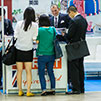UK firms take slice of tough Japan market
The proud noses of our friends across the English Channel have been out of joint ever since it was revealed that the approximately 400 different types of cheese produced in France is a pale shadow of the more than 700 varieties now made in the UK.
Moreover, a renaissance in demand for top-quality, niche British cheeses means that figure is still growing.
While we may not produce the most in terms of volume—the Americans take that particular title, thanks to their vast appetite for processed and mass-produced mozzarella and cheddar—or consume the most per head—the average French person eats a whopping 26.3kg of cheese every year—British cheese-makers are at the top of the craft when it comes to taste, texture and variety.
This makes it even more annoying for Brits in Japan to be confronted by a limited range of limp and lifeless processed cheese in an average Japanese supermarket.
“I couldn’t claim that we had any experience when we set the company up three years ago. We were just enthusiastic and massive consumers [of cheese]”, said Sean Brophy, managing director of I Love Cheese Co., Ltd. “And I couldn’t get what I wanted here”.
After starting on a limited scale, the firm is now importing up to 60kg of top-quality, artisan cheeses from the UK every month, said Stephen Davies, president.
Sourced from specialist makers covering the highlands of Scotland to Cornwall, I Love Cheese is selling to individuals through its website, and increasingly building contacts with restaurants throughout Tokyo to stock British dairy products.
“The business grew out of a conversation I had with Stephen about four years ago. We initially talked about opening a specialist shop for British cheese, but when we looked into it more closely, the costs were simply prohibitive”, said 54-year-old Brophy, a freelance technical translator who is originally from Coventry but has been in Japan for 24 years.
There followed a fairly steep learning curve on British cheeses, the local market here, and forging relationships with manufacturers in the UK.
The pair also had to figure out the complicated process of importing what the Japanese tax authorities consider to be a luxury foodstuff, on which they impose heavy duties.
“It has been tricky”, admits 43-year-old Davies, from Bromsgrove in the West Midlands, who balances the cheese business with his job in a specialist travel agency.
“We are taxed under CIF [Cost, Insurance and Freight], which means that the rate is determined by combining what we paid for the cheese plus the freight costs”, said Davies. “And that obviously makes our costs higher and the price for the consumer higher.
“What we find puzzling is that the tax authorities do not use the same calculation for other goods that might be considered luxury items”, he said.
British beer and wine, for example, are exempt. Equally, cheese that is imported in bulk from some of the largest manufacturers, such as Australia and New Zealand, is also exempt from all taxes if it is to be used in other types of processed food here.
“The high taxes obviously mean that there is a limit on how low we can go on our prices, but we are hopeful that something positive might come out of the international trade agreement that is being discussed between Japan and the European Union”, Brophy added.
Around 80% of the people who purchase on-line are British expats who would simply not otherwise be able to get their hands on something like a Berkswell Artisan ewes’ milk cheese, coated in its distinctive thick rind, or a Yarg that has been wrapped in the leaves of nettles.
The remaining 20% are Japanese, said Davies. The business partners are aiming to build up a solid base of expat customers at the same time as sharing their love for British cheese with more Japanese people.
In time, they anticipate that the split will be reversed, with perhaps even 90% of their business coming from high-end restaurants across Japan.
One method of doing that is by holding regular cheese-tasting events at bars and restaurants around Tokyo. The I Love Cheese roadshow made an appearance at The White Fox restaurant near Oji Station, opened by classically trained British chef Trevor Blyth in 2006.
“It has always been quite difficult to get good British cheese because there is one major importer of top-quality European cheeses, but they focus on French and Italian makers, and have a very limited selection of British cheeses”, said Blyth. “And they’re expensive.
“The food we serve here is tapas-style, a fusion of French and Japanese cooking, but it also fits very well with British cheeses and wines, and our sales of UK cheese varieties are doing very well now”, he said. “We are even finding that some older Japanese people are stopping in here as they change trains on their way home and having a glass of wine and a selection of cheese”.
Arrayed on his counter are just some of the I Love Cheese offerings, including a dark and crumbly Aged Leicestershire Red, a round of the very popular Capricorn Somerset goat’s cheese and a Lincolnshire Poacher. Veins course through the dark orange of a Blue Shropshire, while the Sage Derby is flecked with green.
“I really believe there is a great deal of potential demand for these sorts of cheeses here”, Blyth said, adding that new scientific research is helping, as it is debunking some of the myths about cheese being unhealthy.
Cheese that is made in a traditional way and only contains natural fat is actually good for the human digestive system, according to studies, although the stabilised fat typically found in processed cheese is a different matter.
The Alvis family, owners of Lye Cross Farm in Somerset, have already made substantial inroads into the South Korean market with their hand-made West Country Farmhouse Cheddar, and are looking to build on the contacts they have in Japan.
“We have found that one of the difficulties is that the channels to market are very heavily structured”, Tim Harrap, head of collaboration for the firm, told BCCJ ACUMEN. “They have been in place for so many years that the distribution networks are pretty rigid and difficult to break out from”.
Harrap took part in a three-day trade mission to Japan with Dacian Ciolo, European commissioner for agriculture and rural development.
The aim was to promote Lye Cross Farm’s organic cheeses and its Protected Designation of Origin (PDO) cheese, a label that indicates a foodstuff that originates in a specific town or region, which has characteristics linked to that place and is produced in a defined geographical area. Lye Cross Farm’s production facilities are a mere 10km from the village of Cheddar.
“I went on a similar trade mission to China a few years ago and it proved successful”, Harrap said. “We are now doing a lot of business with our PDO cheese in South Korea and we would like to develop other markets, such as Japan.
“I’m hoping this trip helps to build our credibility in the market, builds the profile of Lye Cross Farm, and that we can take things forward from there”, he explained.
While cheese has traditionally been considered a French speciality among Japanese consumers, Blyth believes a new generation of cheese-lovers here might be favouring imports from the UK.
“Until now, a lot of Japanese didn’t even realise that Britain makes cheese—and that it can be so good”, he said.
www.ilovecheese.jp





